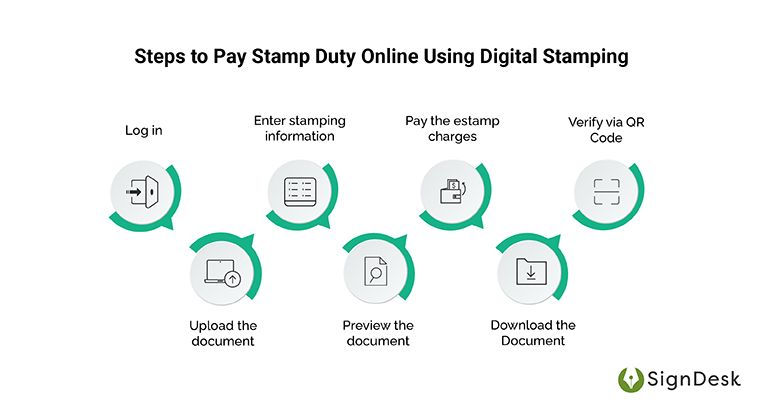Digital Stamping: An Overview of Stamp Duty & Payment Methods

Digital Stamping is a method of paying non-judicial stamp duty on agreements, contracts, and other documents enabled by legal technology. An alternative to traditional methods of stamp duty payment such as paper stamps and franking, digital stamping involves an eStamping procedure wherein document or contract owners pay the requisite stamp duty online and receive their document eStamped and merged with stamp paper.
Digital stamping both streamlines and expedites the stamping process by eliminating the need to manually procure stamp papers from vendors, document storage errors, conveyance and storage costs, and any delays resulting from poor document management.
An eStamp, visible on a digitally stamped document, both serves as proof of stamp duty payment and verifies that a document or other piece of information supplied electronically comes from the institution that sent it. The latter process is additionally made more convenient via stamp paper QR codes provided by digital stamping solutions, which provide all the relevant stamping details once scanned.
eStamp or digital stamps for business can be utilized in almost all Indian states, with other semi-online stamping methods such as eSampadha and eSBTR operational in states such as Rajasthan and Maharashtra.
Stamp duty payment, the purpose of eStamping, is a regulatory requirement for businesses (and individuals engaged in certain commercial & legal activities) and is governed by regulations such as the Indian Stamp Act and the Indian Contract Act.
What is Stamp Duty?
To enable stamping and document legalization, stamp duty needs to be paid. So, the question arises what is stamp duty?
Stamp duty is an amount that state governments charge on the purchase of legal documents and to legalize agreements. These documents are generally used to deal with the agreements and transfers of certain instruments (property, services, capital, etc) between two or more parties. Stamp duty all falls under the Indian Stamp Act of 1899 and is further formalized by individual state stamping acts.
Stamp duty is a legal tax that must be paid in full and serves as proof of certain transactions and acquisitions. Stamp duty is a state-level levy, hence stamp duty rates differ from one state to the next. However, the union government also imposes stamp duty on certain instruments and sets their rates.
The Legality of Digital Stamping in India
The Indian Stamp Act of 1899 actually asks to pay a certain amount of money for documents that are used in legal transactions and contracts.
Digital stamping is still a relatively new process and minor apprehensions regarding its legal efficacy are not unexpected. While digital stamping is not directly mentioned within the Indian Stamp Act, the procedure of eStamping is already popular among several states and individual states have already issued E-Stamping rules and regulations to govern online stamp duty payment. To learn more about the step-wise legality of the digital stamping process, go here.
The aim of stamp duty payment is for the Indian government to earn income and create a record of transactions involving large assets. In a court of law, a stamped document is also considered valid evidence as getting documents stamped renders them legally legitimate and authentic. Digital stamping, by making the stamp duty payment process easier, enables a smoother cash flow for state governments and better recordkeeping.
Stamp Papers and Why Businesses Need Them
To generate contracts, agreements, and affidavits, stamp papers are required. Every contract, from the lease for the office to an agreement with a vendor or distributor, must be legalized by paying stamp duty.
The absence of easy and rapid access to stamped documents, even after all these, causes delays in operations like onboarding vendors and entering client and service agreements.
If stamp duty is not paid on an agreement, however, the agreement will not be regarded as legal evidence in court if one of the parties breaks the conditions of the agreement. Additionally, the cost and time associated with stamp paper procurement and document storage make stamp duty payment a point of friction for businesses.
With innovations in legal technology, the full procedure of getting several hundreds of documents stamped can be wrapped up within a day. This decreases the amount of time it takes for paperwork to be processed, making the documentation workflow simple and convenient and enabling easy onboarding and smooth operations.
How Can Businesses Pay Stamp Duty?
Stamp duty has always been considered an important aspect of any business or industry. It can be paid in the form of
- Traditional or Physical Stamp Papers
The physical stamp papers are the most conventional form of paying stamp duty. The stamp papers have the stamp duties printed upon them, which on purchasing will enable a user to carry out the transactions and payments. But generally, these papers cost a lot and also take time to get generated for which it has lost its demand since the advent of franking or estamp papers.
- Franking
Frank, originating from the French term, affranchir means free was used widely as a sign for a package whose transmission charges were next to none or free.
In modern-day, franking has been described as the mark on the stamp paper which indicates that the stamp duty has been paid by the user. The mark is put on the stamp paper to ensure the fact that the stamp duty has been paid.
For minor sums, franking agencies and banks request the franking charges in cash, while larger amounts require a pay order. The regulations for franking may differ across states and even different agents within a jurisdiction. In addition, franking is only accessible on weekdays and for a limited number of hours.
- E-Stamping
An attempt to ease the process of stamp duty, digital stamping, or e-stamping which is basically using a digital stamp has been initiated by the government of India. It is a simple way of paying stamp duty online involving relatively little time as well as cost and is the latest addition to the legal tech industry. In India, the authority for estamping is with the Stock Holding Corporation of India Limited.
Digital stamping enables businesses to upload documents in bulk to an eStamping portal and get agreements eStamped in minutes, reducing the turnaround time for processes such as onboarding, service delivery, and asset transfer by more than half.
Which Industries Require Digital Stamping?
For day-to-day dealings and transactions, nearly all industries require stamp paper. With a smooth and streamlined process that is also time-efficient, digital stamping helps the following industries the most:
- BFSI Sector:
Banks and other financial institutions require stamp paper to undertake the process of disbursal of loans, especially. Digital stamping helps in easing out the process as it cuts out a lot of time that is usually required if one is using paper stamping processes. Banks and insurers can streamline the onboarding process, and financial service firms can ensure a strong digital paper trail for all their important transactions.
- HR Consultancy Services & Freelancers:
Consultancy services and the gig economy, in general, establish a large number of employment agreements daily. HR and consultancy services are required to get employee agreements stamped, for which digital stamping is an efficient and cost-effective alternative to manually procuring stamp papers. Integrating with eSign solutions can additionally enable HR firms and freelancer agencies to drastically reduce their onboarding TATs.
- FMCG Sector:
Businesses in this sector frequently undertake the process of vendor onboarding and procurement. The creation and legalization of vendor contracts constitute an important part of this sector, which involves the FMCG business drafting, paying stamp duty, and signing the vendor or distributor agreement. A Digital Stamping Solution combined with an optional eSign service can reduce vendor onboarding time from a week to a day, which furthermore cuts down the operational costs too.
- Real Estates and Housing:
House rentals form a massive industry where people sign and agree on terms and conditions before taking rooms or houses on rent for accommodation. Renting housing or transferring property both require legal documents to be stamped. Digital stamping enables renters, individual landlords, housing associations, and real estate firms to pay stamp duty online and avoid the troubles of the manual process.
- Legal Firms:
Judicial Stamp Papers are used for preparations and entries related to the administration of justice, and they are subject to duty in the form of court fees. A magistrate will not utilize non-judicial stamped paper for judicial activities including drafting orders and rulings, and will not accept pleas submitted on such paper.
- Pharmaceutical Companies:
To ensure that operations operate effectively, the pharmaceutical sector relies extensively on external vendors and suppliers, drug research and testing companies, hospital representatives, regulatory liaison officers, and a variety of stakeholders.
A pharmaceutical company’s connection with any of these stakeholders is determined and carried out through contracts, which are completed only when the stamping is done properly.
How to Digitally Stamp Documents?
Parties involved in an agreement must pay stamp duty on every compulsory transaction in order to complete these transactions and settlements. To complete the stamp duty payment process, the buyer had to be present at the registrar’s office or approach several other government departments or lawyers.
Digital stamping solutions ease this process by providing an online gateway for citizens and corporations to complete the procedure.
Paying stamp duty online using digital stamping involves a few simple steps:

- Log in to the digital stamping portal
- Upload the document that needs to be stamped or use a document template
- Enter the relevant stamping information including the names of the parties involved, stamp paper denominations, state, stamp amount, etc.
- Preview the document to be stamped
- Pay the estamp charges through an online wallet
- Download the stamped document or proceed to add signers for eSignatures.
- Once the document is executed, scan the QR code to verify the estamp certificate for the document.
By utilizing Digital Stamping technology, contracts become legally enforceable with just a few clicks. If required, the relevant stakeholders can be invited to eSign the document to complete digital document execution.
SignDesk’s Digital Stamping Solution: Stamp.It
SignDesk’s Stamp.It is a nationally acclaimed digital stamping solution with eSign integrations.
Businesses can use India’s top digital stamping tool, stamp.it, to reduce documentation turnaround time from days to minutes.
Stamp.It enables businesses to expedite the following processes:
-
-
- Digitization of organizational templates on a large scale
- Stamp duty payments for bulk documents
- Bulk signings for vendor and distributor agreements while on the fly
- Execution of Remote Agreements
- Creating procedures for fast-paced documentation
- Digital stamp for business and custom eSign workflow for numerous industrial segments and business teams
-
To make documents legally binding, create them online, pay stamp duty online, and have the signatories eSign the documents.
Stamp.it now allows you to create and execute contracts in as little as 5-10 minutes.